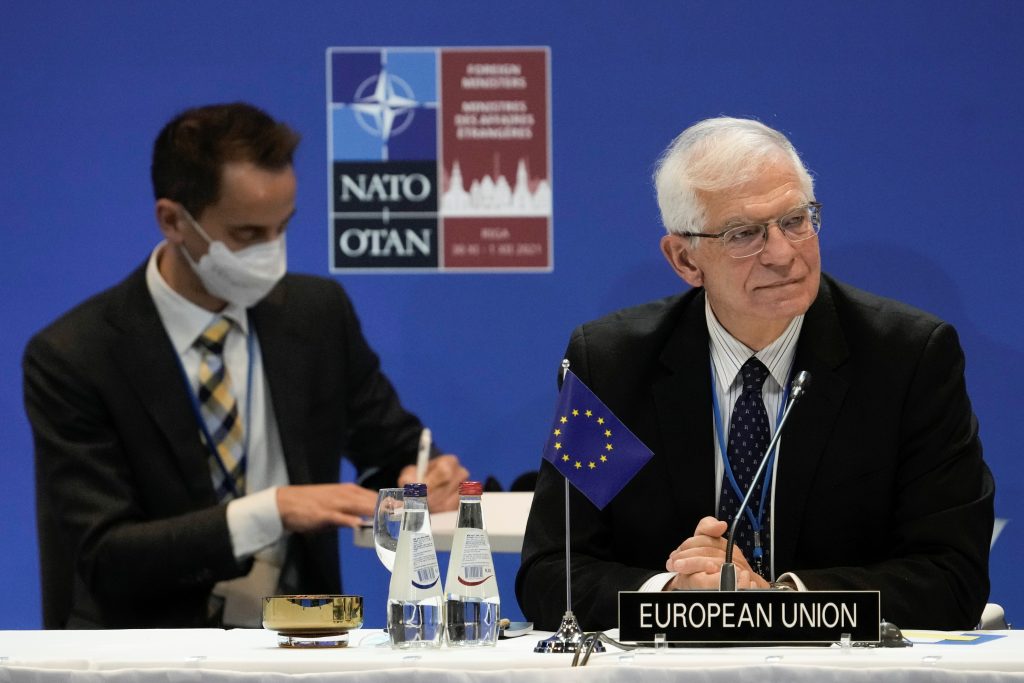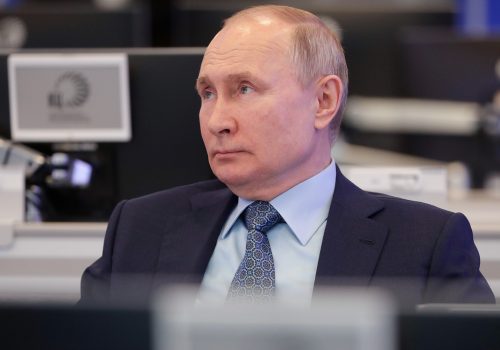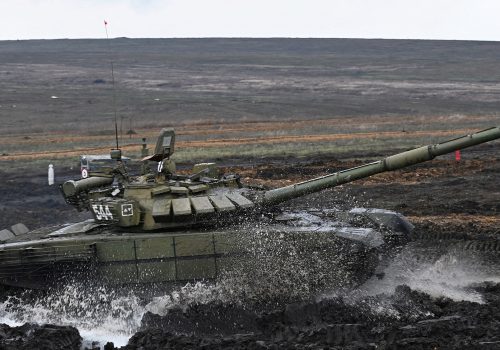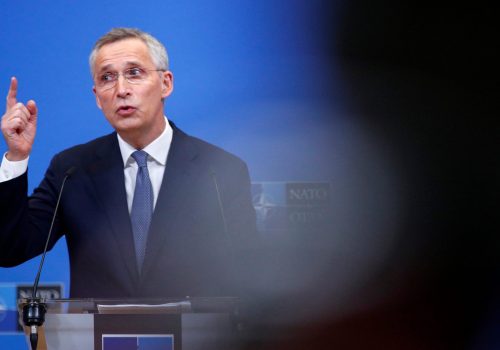After a flurry of diplomacy that failed to de-escalate the crisis over Ukraine, Europeans find themselves searching for an appropriate response to aggressive Russian brinksmanship. Experts from the Atlantic Council’s Europe Center set out to analyze the extraordinarily difficult situation facing the continent. How can Europe maximize its impact, given its strengths? And how can European countries stick together rather than hang apart?
Jump to an expert reaction
Rachel Rizzo: Build a common strategic culture
Daniel Fried: European sanctions require only broad alignment, not unanimity
Damir Marusic: Strategic autonomy must be more than an announcement
Marie Jourdain: Bringing the EU’s might to bear
Ben Judah: Dear Britain: Talk in Brussels
Petr Tůma: Revive the Normandy Format
Build a common strategic culture
As diplomatic attempts to defuse the crisis over Ukraine continue to falter, Europeans and Americans are preparing for the worst. But what do we even mean when we say “Europeans”? A joint approach to Russia has thus far eluded the continent. European policymakers tout values and unity ahead of developing capabilities that would allow them to have an impact on the crisis. And some of the most important players seem to be watching from the sidelines. The new German government has been unwilling to come out forcefully against Russian aggression, refusing to threaten Russia with the prospect of blocking the Nord Stream 2 pipeline. Other countries continue to waver on cutting Russia off from the international SWIFT banking system.
Europeans need to start working on developing a shared strategic culture. Russia’s aggression should focus minds. Russian President Vladimir Putin correctly continues to view talks with Europeans as tangential—the only consequential player is the United States. The European Intervention Initiative, which was meant in part to help spur the emergence of a European strategic culture, was a good start. More is needed. Until the Europeans are willing to put capabilities behind rhetoric, and strategic decision making behind individual diplomatic efforts, they will continue to be relegated to the sidelines.
—Rachel Rizzo is a senior fellow at the Europe Center.
European sanctions require only broad alignment, not unanimity
The European Union (EU) is critical to one major operational element of a prospective Western response to Putin’s aggression against Ukraine: escalating sanctions and, in parallel, escalating export controls. The United States can of course impose unilateral sanctions on Russian targets, especially financial sanctions. But without EU buy-in, these could have less political impact. The good news is that, despite differences within Europe and open divisions within the German government (especially about Nord Stream 2), it is likely that the EU is already roughly in sync with the United States. Should Putin launch a full-scale land invasion of Ukraine, the EU is likely to back the sanctions the United States has hinted at, including financial sanctions that would hit large Russian state banks and other state-owned companies. Europe’s own sanctions need not be identical to work. Broad alignment will do the trick.
Maintaining a common transatlantic response could prove more complex should Putin’s next moves against Ukraine fall short of a full invasion that drives toward Kyiv. Smaller moves by Russia are likely to trigger a debate about what a “proportional”—that is to say, weaker—response might involve. Still more complex would be a limited Russian incursion followed by “peace proposals” that reduced current maximalist Russian demands but still insisted on things such as closing NATO’s “open door” to countries like Ukraine. Would EU member states start to break ranks in such a scenario? I remain optimistic that they won’t, but we shall perhaps soon see my optimism tested.
—Daniel Fried is the Weiser Family distinguished fellow at the Atlantic Council.
Strategic autonomy must be more than an announcement
Earlier this month, the New York Times reported that EU foreign policy chief Josep Borrell had sent a letter to EU foreign ministers insisting that the Union “must be at the table” for any talks with Russia about the future of European security and that he had “initiated a discrete direct conversation” with Russian Foreign Minister Sergei Lavrov on the subject. Presumably rebuffed by the Russians, by the Americans, and even by many EU member country foreign ministers, Borrell was less vocal this past week, saying he felt confident that, after extensive consultations, the West was singing from the same hymn book and that Europe’s perspective was being adequately represented in the high-stakes dialogues with the Kremlin. Many scorned Borrell for grandstanding. Already humiliated once by Lavrov a year ago, Borrell’s attempt at boldness instead telegraphed unseemly eagerness and showed the Russians that they have plenty of opportunities to weaponize petty continental vanities for their own purposes.
This week, French President Emmanuel Macron picked up where Borrell had left off, arguing that the EU ought to propose its own security vision for the continent and present it to the United States via NATO before approaching Russia with a proposal. Macron’s statement does not meaningfully correct for the deficiencies of Borrell’s initiative. The issue is less with the ambition—Europeans asserting sovereignty over their own vital security interests would be a welcome development—than with the announcement of said ambition with nothing more to show for it. Sidelined from the main table, EU member states ought to be taking the time to quietly work out their common security approach amongst themselves. Simply announcing it, however, is at best a distraction—and potentially quite a dangerous one—at this fraught and unpredictable moment.
—Damir Marusic is a senior fellow at the Europe Center.
Bringing the EU’s might to bear
The crisis over Ukraine is really about European security. The challenge for Europe is that there is little consensus on what the EU itself can or should do to address the crisis. The difficulty rests not so much on the legitimacy of the EU taking action, but rather on what its role should look like. Some member states worry that the possibility of the EU making its own proposals might undermine transatlantic unity; others fret that deepening the EU’s support for Kyiv (expanding it further than the Advisory Mission in Ukraine and the 31-million-euro assistance measure to Ukraine approved in early December) could be used as a pretext by Russia to justify further escalation; and others still wonder how the EU can make its singular voice heard: The EU is not a member of the Normandy Format or the Organization for Security and Cooperation in Europe (even though all EU member states are part of the latter).
In short, the EU has a fair bit of work ahead of it. Not only must its member states develop a more coherent view of what Russia means for the their collective security and interests (the Strategic Compass provides the opportunity for progress here), but they must also agree on the instruments that the EU should mobilize “to advance [its] security interests and that of [its] partners.” Until a consensus emerges on all these issues, the EU will continue to struggle responding to dangerous, quick-moving crises such as the current one.
—Marie Jourdain is a visiting fellow at the Europe Center.
Dear Britain: Talk in Brussels
On Friday morning, possibly for the first time ever, “God Save The Queen” was trending on Twitter in Ukraine as the country reacted to the arms lift from London, which has resulted in more than two thousand anti-tank missiles and thirty special forces trainers being sent to the country. For all Prime Minister Boris Johnson’s domestic political problems, Britain has been noticeably active in the Ukraine crisis, from signing a deal to boost Ukraine’s navy to sending ministers on official visits and positioning elite troops on the ground to train Ukrainian armed forces. While materially these moves might not have a decisive impact should Russia decide to invade, the serenading of Her Majesty shows they have positively affected morale.
Alongside the United Kingdom, a noticeable European sub-alliance has started to take shape that is stepping up to materially support Kyiv: Arms and military trainers are being dispatched or have been promised from the Baltics, the Czech Republic, the Netherlands, Denmark and Canada. On the one hand, this development suggests how an activist, post-Brexit Britain can set the tone on the international scene. But it also highlights limitations to this clout. The recent strain on relations with Brussels and Paris in particular has dented Britain’s persuasive abilities when it comes to significant partners like France and Germany. Britain has in the past spoken to a bigger coalition than this, and it has done so in Brussels. It’s time to repair the damage. The UK foreign and defense secretaries should offer to fly to Brussels to informally brief either the EU Foreign Affairs Council or the European Council itself. British diplomats should start informally briefing EU institutions on the crisis on a recurring basis. Neither side benefits when Britain sits on the outside. Britain needs to make the case to expand the activist coalition on Ukraine—and the EU needs to hear it.
—Ben Judah is a senior fellow at the Europe Center.
Revive the Normandy Format
Europe rightly feels frustrated that it is playing only a secondary role in the ongoing diplomatic efforts to de-escalate the crisis over Ukraine. In response, there have been new attempts by Berlin and Paris to resuscitate the long-stagnant Normandy Format (gathering Ukraine, Russia, France, and Germany), with ambitious plans to convene a summit by the end of this month. This is not a bad idea. The Normandy Format is an established framework with a track record. It may fail, but if it does, it will give further evidence of where Russia stands (if it refuses to negotiate). Kyiv, despite its own reservations about the 2014 Minsk agreements, is now on board.
Moscow has used the Normandy Format for its own sake, portraying Donetsk and Luhansk as internal Ukrainian problems, positioning itself alongside Germany and France as a mere mediator. The Kremlin’s narrative is now crumbling as Russia has overtly taken on the role of the aggressor. Putin seems to be slightly taken aback by the West’s tougher and more coherent response, especially compared to 2014. A diplomatic off-ramp should be ready in case he decides to de-escalate. The Normandy Format can play that role. At the same time, Paris and Berlin should ensure that the process does not boil down to only Ukraine making concessions. Russia started this escalation and can’t be simply rewarded for backing off. Both sides will need to give up something.
—Petr Tůma is a visiting fellow at the Europe Center.
Further reading
Fri, Jan 21, 2022
What if Russia invades Ukraine (again)? Consider these options for sanctions escalation.
New Atlanticist By Brian O’Toole, Daniel Fried
Whatever Putin’s intentions, the Kremlin’s anti-Ukrainian propaganda has not been so loud since 2014. The United States and its allies need to respond in order to prevent a major military escalation at worst and at least blunt Putin’s effort to gain political advantage through intimidation.
Thu, Jan 20, 2022
Will Russia make a military move against Ukraine? Follow these clues.
Experts react By
Our military fellows from the US Army, Navy, Air Force, and Marine Corps give a sense of the movements from Russia that they're tracking most closely.
Tue, Jan 18, 2022
No consensus? No problem. Why NATO is still effective.
New Atlanticist By Christopher Skaluba, Conor Rodihan
Don't believe what you hear: NATO can still contribute invaluably to Ukraine’s sovereignty.
Image: EU's foreign policy chief and European Commission Vice-President Josep Borrell attends the NATO Foreign Ministers summit in Riga, Latvia on December 1, 2021. Photo by Ints Kalnins/Reuters.



